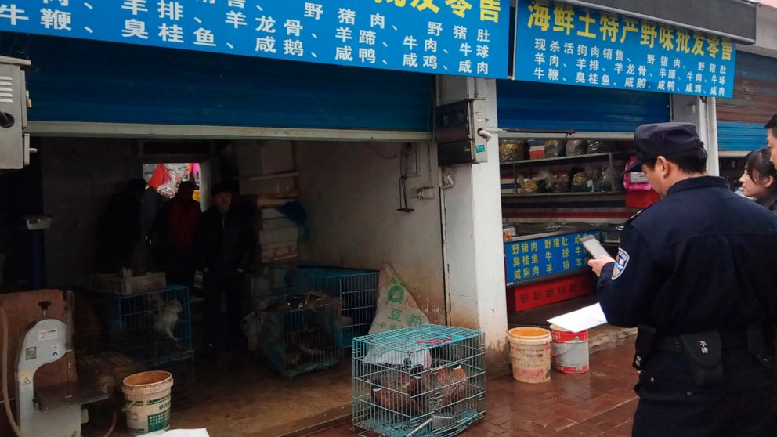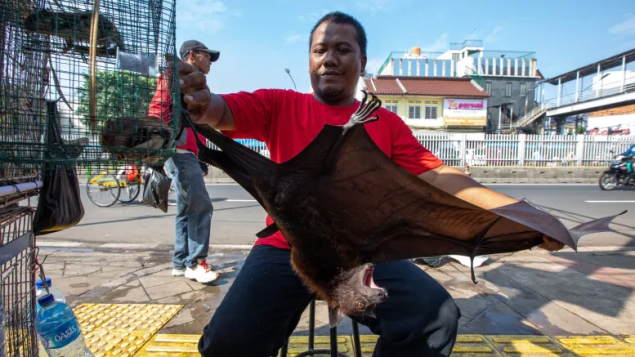Researchers are calling for countries around the world to close wildlife markets, also known as ‘wet’ markets.
These markets usually sell a wide variety of typically domesticated animals like pigs and chickens, with any number of wild animals including bats, civet cats, monkeys and so on.
Butchering often also takes place on site, creating highly unsanitary conditions of spilled blood, entrails, urine, faeces, and so on.
These markets have been long-standing traditions in China, elsewhere in Asia and Africa.
Indeed one theory has the deadly Spanish flu of 1918-20 to have originated with Chinese labourers brought over to the Americas and Europe.
Scientists have long said these open-air markets are a prime breeding ground for diseases and infections in the wild to make the transitions from wild animals to domestic and then to humans, or directly from wild animals to humans.

A ‘bush meat’ market in Ghana. Live and dead animals, many of them wild species, are sold side by side in these wet markets (World Animal Protection)
These wet markets and so-called “bush meat’ have been linked to previous mass disease outbreaks. These include Ebola, HIV, MERS, SARS, H1N1 (swine flu) and bird flu, the latest being COVID-19, another deadly disease which is suspected to have its origin in bats, which are not an uncommon commodity sold in these markets.
In a scientific study published in February, in Science Daily, UC Berkely researchers noted how bats can drive virus mutation and fight it off at the same time.
“Some bats are able to mount this robust antiviral response, but also balance it with an anti-inflammation response,” said Cara Brook, a postdoctoral Miller Fellow at UC Berkeley and the first author of the study. “Our immune system would generate widespread inflammation if attempting this same antiviral strategy. But bats appear uniquely suited to avoiding the threat of immunopathology.”
After the SARS outbreak in 2003, which apparently originated in a wet market in Guangdong province, the Chinese government banned wet markets and the wildlife farming industry. But shortly after the World Health Organisation declared the outbreak contained, China lifted the bans.

On Jan 9, 2020, members of a Chinese Anti-Poaching Special Squad, police gather outside a store suspected of trafficking in wildlife in the city of Guangde in central China’s Anhui province. China is enforcing a temporary ban on the wildlife trade to contain the outbreak of a new virus, but many are calling for a more permanent solution before disaster strikes again. (Anti-Poaching Special Squad via AP, File)
Bans have again been placed on these markets in China as of February, and also in Vietnam, but there are concerns about how well they are enforced, especially in more rural areas, and how long they may be in place.
In addition, with the bans it appears that online sales of animals are taking place, although attempts are being made to curb that practice,
In addition, with the bans it appears that online sales of animals are taking place, although attempts are being made to curb that practice.
Kerry Bowman, an assistant professor and bioethicist at the University of Toronto’s Dalla Lana School of Public Health
is quoted in the CBC saying that the trade and consumption of wild and exotic species has been embedded in these cultures for thousands of years and has now also become a multi-billion dollar global industry
William Karesh, is executive vice president for health and policy at the EcoHealth Alliance,
a multi-national non-profit conducting research in emerging infectious disease. He is also quoted by the CBC suggesting that instead of immediately trying to stamp out all such trade and industry, the focus should be on first stopping trade in animals most likely to have infections more readily transmitted to humans, like bats, rodents, and primates.
Additional information sources:
- Science Daily Feb 10/20: Coronavirus raises question: Why are bat viruses so deadly?
- CBC: M. Gollom: Mar 27/20: ‘Worse’ pandemic on the horizon unless world deals with wildlife markets
- National Review (USA): T. Shaheen:: Mar 19/20: The Chinese wild animal industry and wet markets must go
- Al Jazeera: M. Standaert: Mar 24/20: Illegal wildlife trade goes online as China shuts down markets
- Independent (UK): J. Dalton: Mar 19/20: Black market wildlife trade could undermine Vietnam’s new ban on disease spreading animal markets
- Associated Press (via CityNews): McNeil/Wang/ Kurtenbach: Jan 26/20: China temporarily bans wildlife trade in wake of outbreak
- Associated Press (via ABC News USA): McNeil/Choi: Feb 14/20: Virus renews safety concerns about slaughtering wild animals.







For reasons beyond our control, and for an undetermined period of time, our comment section is now closed. However, our social networks remain open to your contributions.